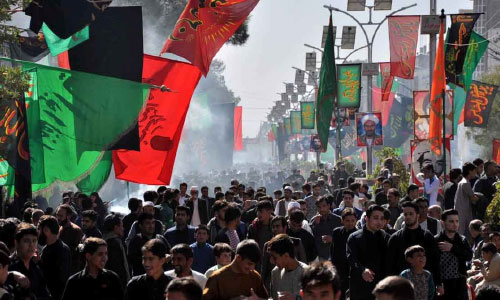A large number of Shiite Muslims conduct mourning sessions in Muharram, a holy month of Shiite Muslims, in which the grandson of Prophet Muhammad (PBUH) Imam Hussein, along with 72 of his companions, had been martyred in his battle against the then dictator regime of Yazid.
In Muharram, clergymen sermonize people around the globe to practice virtue and learn from the revolution of Karbala, a city in Iraq, where Hussein (AS) revolted against the despotic regime of his time. A large number of the clergy interpret the revolution of Hussein (AS) in a moderate way and urge people to raise their concern about injustice and fight for their freedoms. They urge people to shun vice and pursue virtue.
Hussein (AS) pointed out that reform was the main reason behind his revolution. He said he would not pledge allegiance with a cruel caliph such as Yazid-ibne-Muaweyya, who led a corrupt regime. He showed zero tolerance for corruption and moral turpitude that jeopardized the religious beliefs and ethical code of his community and those of Muslim Ummah. The grandson of Prophet sought to follow in Prophet’s footsteps and urge Muslim Ummah to practice upon Sunnah and virtue and shun evil.
Historians say that Yazid, the caliph, operated under religious mask and exploited religion and his sacred position, similar to the current radical groups. Yazid, who inherited the throne from his late father Muaweyya, had urged each and every individuals to pledge allegiance of loyalty to him or else death would be the next choice. However, Hussein (AS) turned down to shake hand with a corrupt ruler since he was trained in a religious family.
The political message of Karbala’s event to politicians – regardless of their religious beliefs – is to render service to a nation wholeheartedly and, in addition to a nation’s religious beliefs and moral values, safeguard its rights and freedoms.
Hussein (AS) fought to bring justice to Islamic world and invested his blood to pave the ground for public rights and freedoms. All politicians have the responsibility to fight for a country’s fate to save a nation.
Afghans also conduct sessions to mourn the death of Hussein (AS) as a religious ritual and clergymen sermonize mourners. The clergy should know that month of Muharram provides them the best platform to broaden the horizon of the public and spread religious tolerance, which is a crying need for Afghan nation in the current sensitive period. Sermonizers should preach in a moderate way and urge people to practice upon the spirit of brotherhood. They should denounce fundamental acts and call on their audience to respect religious beliefs of each individual. The clergymen need to raise their concern about injustice, violence, and corruption ongoing largely across the country.
Practicing religious tolerance is most likely to lead to peaceful coexistence. If all individuals respect the beliefs as well as the rights and freedoms of one another, regardless of their caste, color, or creed, peace will emerge. On the other hand, “disregard and contempt for human rights have resulted in barbarous acts which have outraged the conscience of mankind”, as stated in the Universal Declaration of Human Rights.
Meanwhile, those who admire the brave act of Hussein (AS) and mourn his martyrdom have to set him as a role model and learn from his movement. Hussein (AS) initially sought a peaceful issue rather than resorting to violence. But the caliph left him with two choices either allegiance or sword/death. Since he was the grandson of Prophet Muhammad (PBUH), his allegiance to a corrupt regime indicated his approval and legitimized the regime of Yazid. It was a strong blow to the achievements made by his grandfather. Therefore, Hussein (AS) preferred death to shaking hands with a dictator – which are all lessons to be learnt from his movement.
The mourners of martyrdom of Hussein (AS) have to practice upon his words as he called for virtue and stop showing tendency to corruption and moral turpitude. In other words, simply shedding tear for the death of a great person like him will be of no use unless one’s personal characters are changed for better.
Hussein (AS) has message for one’s individual, social, and political life. His message is that one who seeks to be the leader of a nation should be the person of principle and virtue. He/she should not be corrupt, which would have horrible consequences on the fate of a nation. Meanwhile, he calls on people to pledge allegiance (cast vote) in support of an all-sided qualified person.
Home » Opinion » Message of Muharram
Message of Muharram
| Hujjatullah Zia

